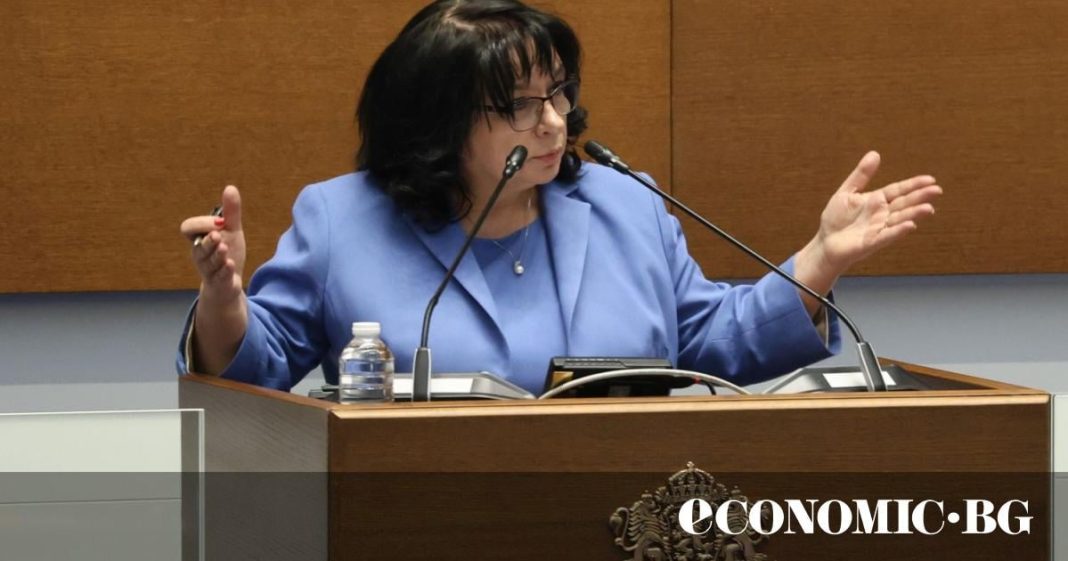Bulgaria’s ruling coalition – GERB, ITN, BSP and both DPSs – adopted on second reading the state budget for 2025, previously described by Finance Minister Temenuzhka Petkova as “the last budget in Bulgarian leva.” The parliamentary session, which discussed the country’s financial framework, lasted 22 hours and ended in the early hours of Friday morning.
The new majority in parliament fulfilled many of the main demands of MP Delyan Peevski, leader of DPS- New Beginning. They allowed the creation of state-owned grocery stores (to be housed in post offices), voted yes on the large debt that will be withdrawn this year, redirected several billion leva to the Bulgarian Development Bank, and lowered the threshold for VAT registration for businesses to 100,000 leva (50 thousand euros).
Regarding the state-owned stores, the proposal by Peevski and his group was submitted in a hurry and without any financial justification. Their idea is to introduce a franchise that sells essential food products with a markup of up to 10%. It is envisaged that the owner of the company’s capital of 5 million euros will be the Ministry of Agriculture.
The MPs obliged the Council of Ministers to take all necessary actions within 1 month to establish the company.
This is reminiscent of the situation with the state-owned gas stations proposed by former Finance Minister Vladislav Goranov before the COVID pandemic. Back then, several million leva were poured in for its founding. The money went for the payment of salaries of the managers who were hired and were supposed to run the operation even though the company never saw the light of day as such.
Basic budget parameters
Otherwise, the main parameters of the state budget remain unchanged.
It will have a deficit of 3%, which paves the way for Bulgaria to join the eurozone. However, the controversial expenditures were retained and will increase by over 9 billion euros this year – an unprecedented increase in the country’s financial history. And in order to cover these impressive public expenses, controversial revenue measures have been put in place. Yet even experts close to GERB – such as Simeon Dyankov and even Vladislav Goranov – said these were difficult to implement.
Finance Minister Temenuzhka Petkova and Prime Minister Rosen Zhelyazkov are counting on reducing the shadow economy by nearly 10% in one year – something that has never happened before.
The MPs voted to increase the state debt by 9 billion euros. This includes 3.5 billion euros that the government plans to pour into state-owned companies – BDB, BEH, etc. This is practically defined by economists as a quasi-deficit and as an additional opportunity for corruption.
20% VAT for restaurants
Contrary to the promises of GERB leader Boyko Borisov, the VAT rate for restaurants will remain at 20%. The proposal submitted by the pro-Russian party Revival to return the rate for that sector to 9% did not find support. On Wednesday, DPS-New Beginning, fulfilling their threats from a previous meeting of the budget committee, submitted a separate bill for amendments to the VAT Act, with which they propose precisely the reduction of the VAT rate for restaurants.
Although there has been talk in recent days about Easter supplements to pensions, the MPs could not find funds for them in the new budget. On Thursday, however, Social Minister Borislav Gutsanov promised that money for this will be found, but it must be done „step by step“. According to him, the ruling coalition will jointly decide what the amount of these supplements will be and whether they will be available for all retirees, or only for those with low pensions. He specified that this will also depend on budget revenues.
Exotic measures in Budget 2025
- Corporate donations – Bulgarian companies will be able to make donations to the budget for the implementation of various infrastructure projects, which will be recognized for tax purposes. The Ministry of Finance expects revenues of between 25 and 40 million euros from this measure.
- The public debt will support state-owned companies – according to one of the measures, the government „may assume state debt for specific programs for the capitalization of commercial companies with capital participation on part of the state in the fields of healthcare, science and education, defense, energy, agriculture, sports and economic development.“
- State-owned grocery stores – a new company will be established (with 5 million euros capital) under the umbrella of the Ministry of Agriculture. The government will have a month to activate all procedures for its establishment and start the operation of the new chain of stores.
- War against the shadow economy – the government is betting that its fight against the shadow economy, estimated at 30-35 billion euros in size, will be able to bring significant revenues to the treasury. For this purpose, gas stations will begin recording the license plates of refueling cars. It is expected that this will bring in 125 million euros. The reason for this measure is that the National Revenue Agency (NRA) has found that at some gas stations, individual customers’ receipts from the day are kept and an invoice is finally issued to companies that may need such a document, without having ever actually used the gas pumps.
Inadmissible proposals
At the beginning of the meeting, the chairman of the budget committee, Delyan Dobrev, proposed a vote on the admissibility of the 38,000 proposals submitted by Revival between the first and second readings of the bill. He reminded the MPs that during the second reading at the budget committee, these texts were deemed inadmissible due to abuse of rights.
If they are inadmissible, they should not be the subject of discussion in the plenary chamber,“ said Dobrev.
Petar Petrov, from Revival, was outraged by the proposal, challenging the grouping of these proposals into just over 60.
Such grouping, as has been done, is unacceptable. This unification does not comply with the Rules of Procedure of the National Assembly,“ Petrov said.
He accused the Speaker of the National Assembly, Natalia Kiselova, of single-handedly ordering the administration how to submit the proposals.
After a revote, 138 of the MPs voted that the texts were inadmissible, 42 were „in favor“ of their admissibility, while 10 voted „abstain“.
The expenditures problem
As Economic.bg wrote some time ago, Budget 2025 envisages not only an ambitious growth in revenues but also a significant increase in expenditures – to the tune of 9 billion euros. This increase was criticized by Assen Vassilev, former Finance Minister and co-chair of PP-DB. In his words, Budget 2025 “raises expenditures more than twice compared to the largest increase we have seen in the history of Bulgaria.”
What is more worrying is that in one year the state’s net debt is set to increase more than in the last three years,“ said Vassilev.
The budget includes a ceiling for a new debt of 9.5 billion euros. According to PP-DB, however, only 6 billion euros are needed to finance the deficit and refinance payments on old debt. “These additional 3.5 billion euros, which will go to the BDB and other state-owned companies, take us back to the times of the Borisov 3 government when we saw reckless spending and corrupt practices,” said Vassilev.
Vassilev described the lowering of the VAT registration threshold as a „defect“.
One of the biggest defects in this budget is that you want to reduce the threshold for VAT registration from 88,000 to 50,000 euros. This measure will bring absolutely no revenue to the budget, but it will hinder 200,000 small businesses,“ said Vassilev.
Finance Minister Temenuzhka Petkova, however, immediately responded to Vassilev, blaming him for the volume of expenditures.
The reason why these expenditures have been incurred is the result of the (financial) management in the last 4 years. Our government cannot accumulate such expenditures in two months only,“ said Petkova.
She added that the growth in social and health insurance payments alone in the 2025 Budget compared to 2024 is 2.8 billion euros, but it reflects „the effects of 2022-2023“. As for the reduction of the threshold for VAT registration for businesses, Petkova reminded that VAT is paid by the end consumer and added: „I don’t see how this is racketeering against the small businesses“. She recalled that the measure was the idea of the revenue agency and that according to its calculations, the treasury would be at minus 70 million euros if the VAT threshold was not reduced.
Petar Petrov from Revival warned that the VAT threshold will also harm freelancers and the self-employed. „Yes, freelancers will also be hit – if they get more revenue, they will have to register for VAT and charge their customers 20% more,“ agreed Assen Vassilev.
Translated by Tzvetozar Vincent Iolov
Източник: Economic.bg


